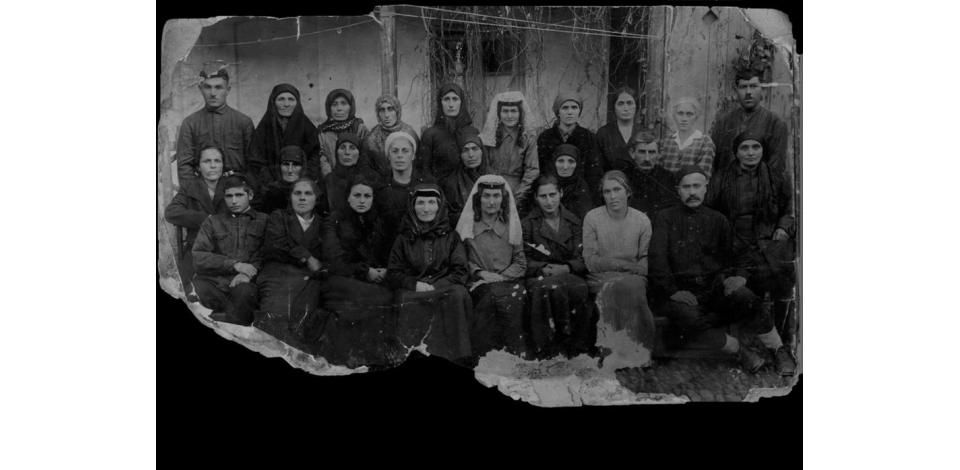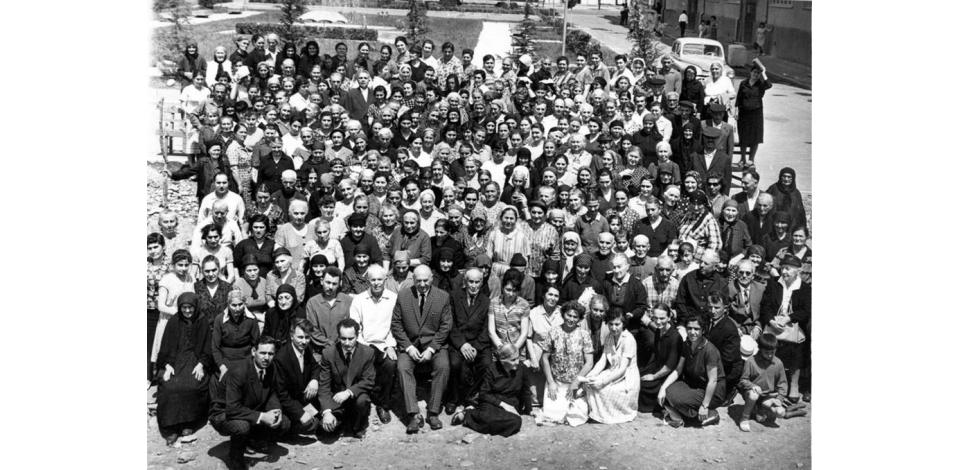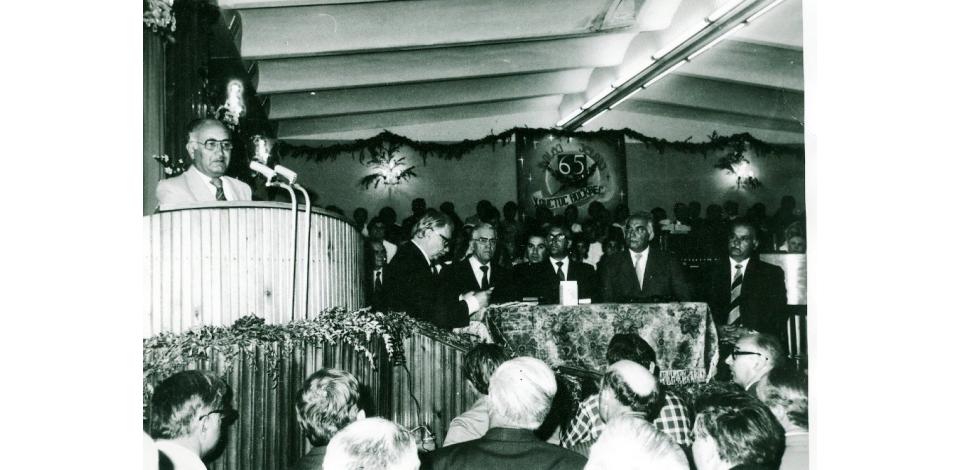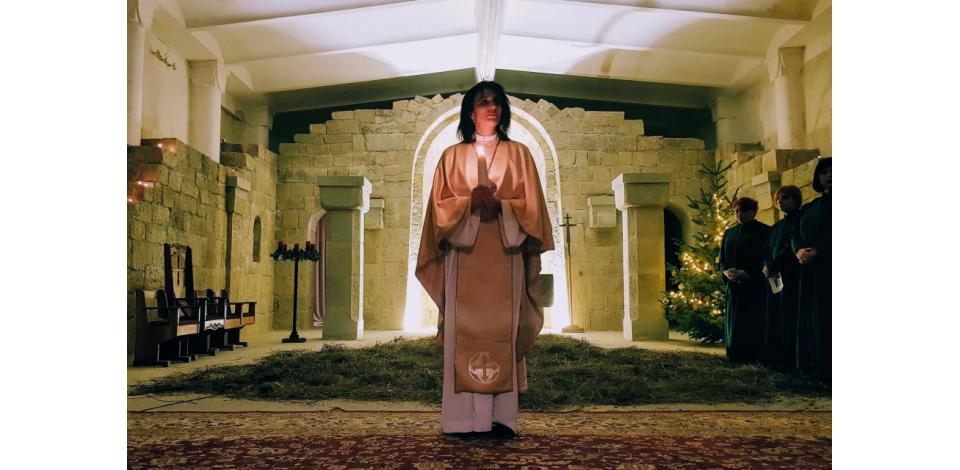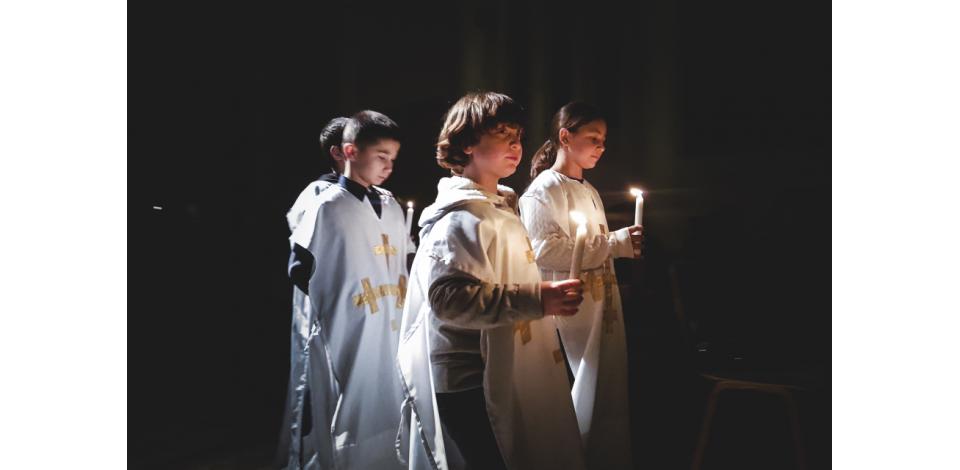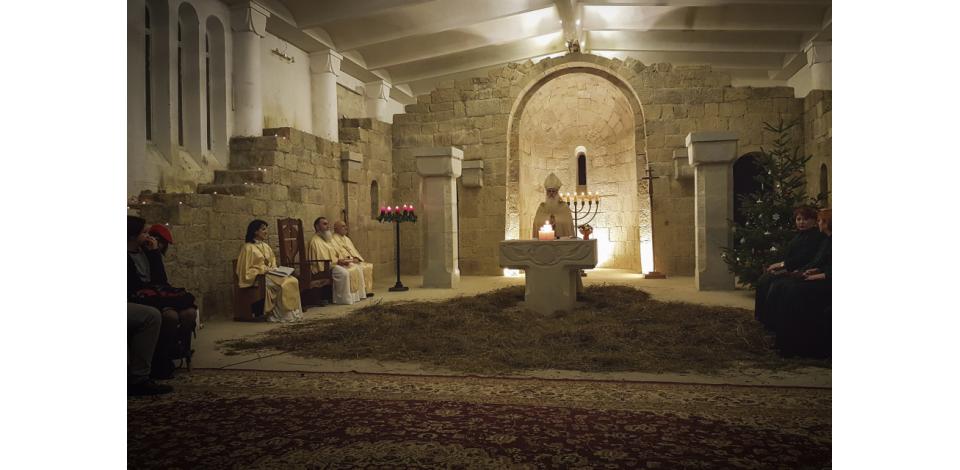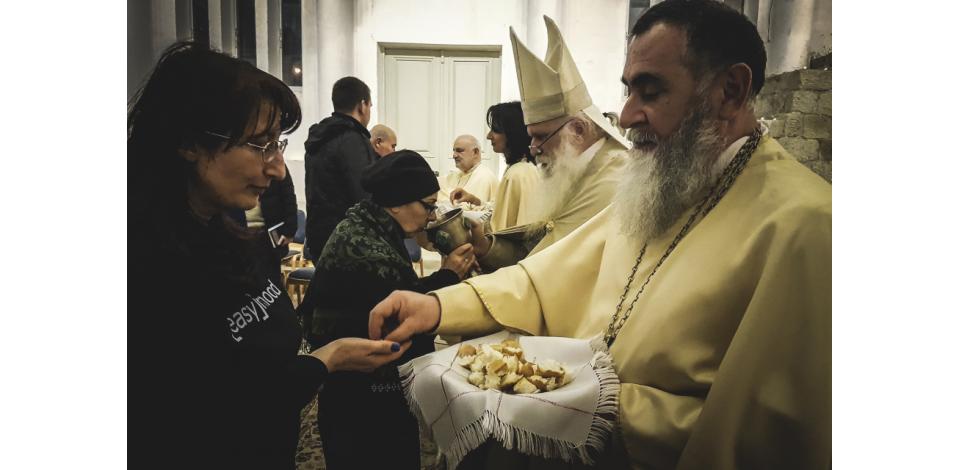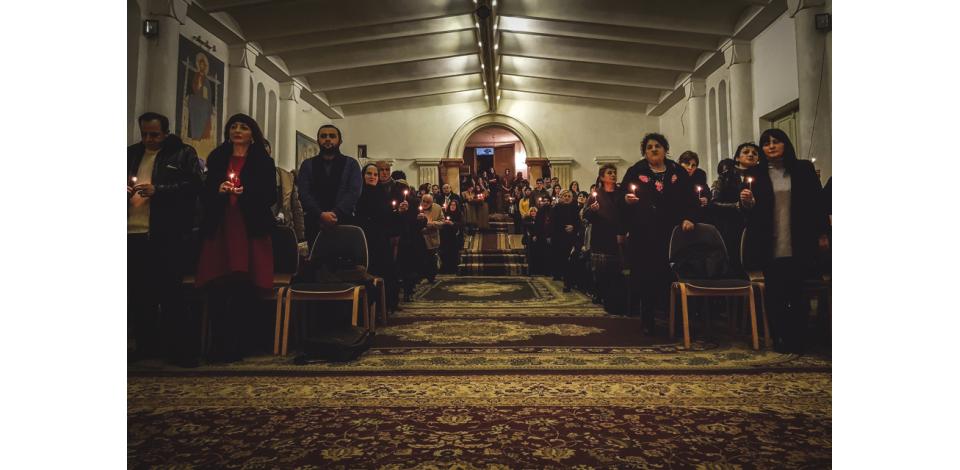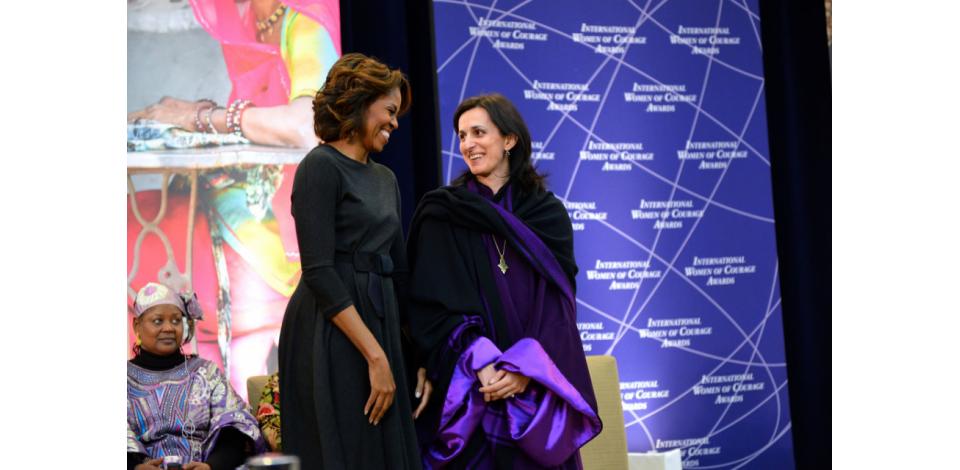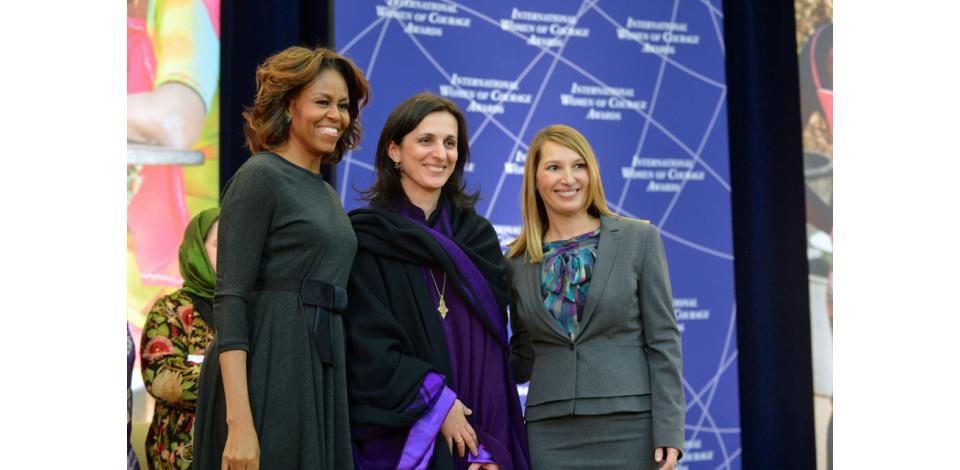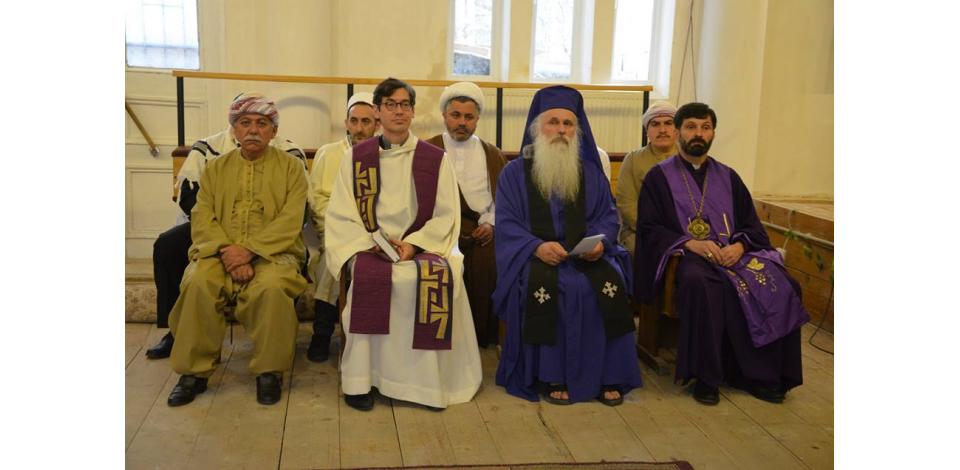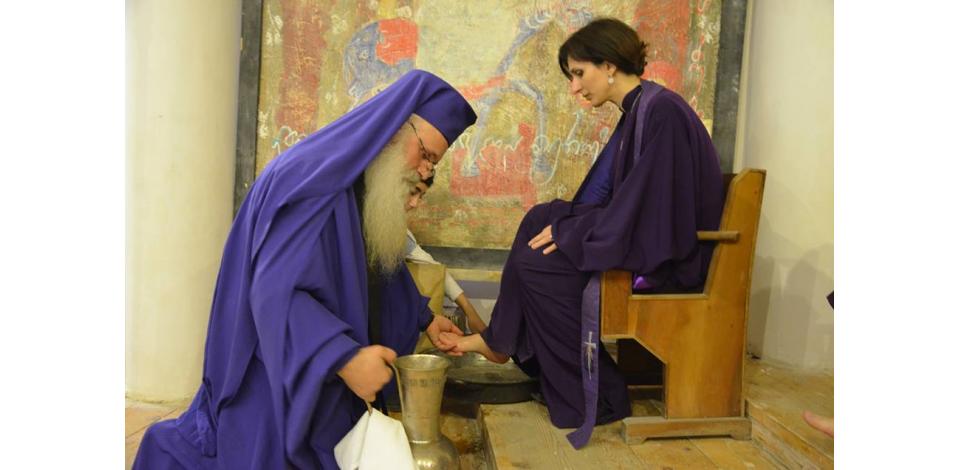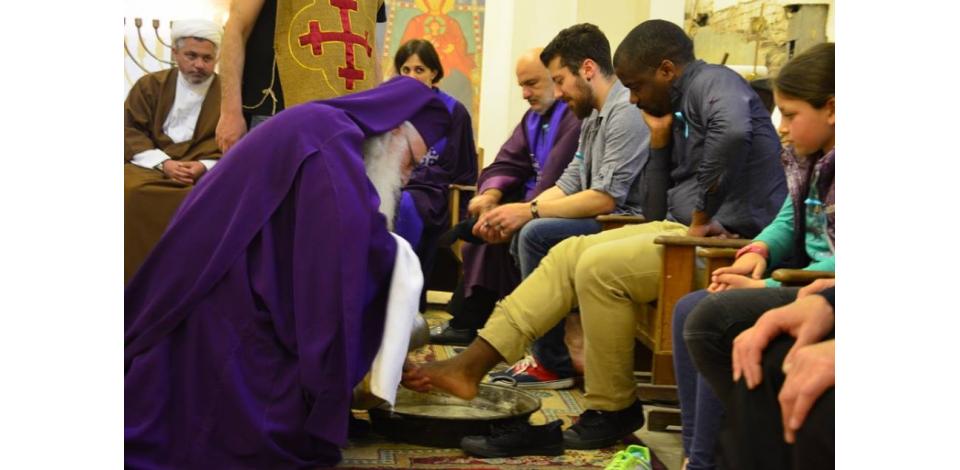THE CHURCH THAT WOMEN SAVED
There is straw spread in front of an altar. The congregation divided into two rows listens to the choir. Children holding burning candles enter the church and proceed to the altar where a bishop is getting ready for a liturgy. The wall of the altar is not built up to the ceiling, it is unfinished. It will remain as such because it symbolizes a continuous quest of the Evangelical Baptist Church for knowledge and development.
“They say, a poet has been beaten in our city because the color of his clothes did not appeal to the tastes of the assailants. If a person may be manhandled for the color of the clothes, is there any sense in celebrating Christmas today?” with these words Bishop Malkhaz Songulashvili of the Evangelical Baptist Church addressed the congregation in the Church.
Leaders of the Evangelical Baptist Church believe that “the church must understand what people are concerned about, what hurts them.”
Speaking up about important events and supporting people of different identity is not strange to this Church. With its public support to oppressed and discriminated people, the Evangelical Baptist Church has repeatedly drawn the attention of society in the recent past. For example, when Jehovah’s Witnesses, Muslims, Yezidis and people of other denominations were persecuted, the Evangelical Baptist Church chose to stand by them.
In 2017, the Evangelical Baptist Church marked the 150th anniversary of its existence in Georgia. During this period, the Church underwent reforms within a relatively short time span and today, it is one of important religious associations that acts as a defender of human rights. This Church hugely contributes to the furtherance of interfaith dialogue and tolerance.
In their sermons, bishops often talk about local or global problems – discrimination, racism, environmental pollution and ecology. This Church, in the form we know it today, was forged through the Soviet repressions it experienced, the faith that women saved and the openness to innovations.
“We need religion to see God in every human being regardless of who that individual is and a religion that tells me to turn my back on, or despise, or disdain even a single individual is not worth a dime,” Bishop Malkhaz Songlulashvili said in his 2018 Easter sermon.
There are several Baptist communities in Georgia and they differ from one another by theology and ecclesiology. This difference is manifested in their attitudes towards ecumenical relations and social issues. Views about the interfaith dialogue and treatment of minorities vary as well within the Evangelical Baptist Church of Georgia.
Evangelical Baptist Church of Georgia
According to the leaders of the Evangelical Baptist Church, Georgia counts around 5,000 Baptists and the majority of them lives in Tbilisi. Members of the community also live in Zugdidi, Ozurgeti, Poti, Kutaisi, Akhaltsikhe, Gori, Khashuri, Telavi, Lagodekhi, Akhalsopeli, Akhmeta, Dedoplistskaro, Gurjaani and the Gamarjveba village.
The Evangelical Baptist Church was formed in Tbilisi in 1867, within the community of Molokans who had been resettled from Russia. Initially, the Baptist community consisted mainly of ethnic Russians, though Georgians, Armenians and Ossetians were among them too. However, due to a small number of Georgian-speaking believers the service was conducted only in Russian.
It was not until 1919 that a Georgian-language church was founded by Ilia Kandelaki, after he returned from the military service. The religious service in the Georgian language began along with the increase in the Georgian-speaking congregation. This process was supported by the Russian-speaking community. As Bishop Rusudan Gotsiridze recounted, Ilia Kandelaki translated the chants into Georgian.
“He wrote Georgian words in the Russian alphabet so as to enable the choir [of the Russian church] to assist the Georgian service,” Bishop Rusudan Gotsiridze said.
Georgian, Russian, Armenian and Ossetian communities prayed together for years, with the Russian community starting the service and Georgian, Armenian and Ossetian communities continuing it.
Persecution during the Soviet period
A repressive policy of the Soviet rule affected all religious associations. They were persecuted, their gathering places were closed down, religious servants were exiled and worship was prohibited. In 1927, the founder of the Baptist Church, Ilia Kandelaki, was killed.
“On his way home after the religious service, he was followed and shot dead at the railways station in Kisiskhevi (Telavi uyezd). No one could believe back then that this murder was just the beginning of the state terror,” Bishop Malkhaz Songulashvili said.
In the 1930s, the Stalin regime sent the religious leaders, along with many laymen, to exile in Siberia.
“Some of them were able to return from the exile, others were not. The religious leaders who came back were so broken that were unable to continue the religious service. It was only the perseverance of women that saved the Church. Women kept on getting together, reading the Gospel, helping one another. Therefore, later, when the Church gained freedom, no one asked whether a woman could become a religious servant,” Songulashvili said.
The Evangelical Baptist Church is distinguished for its strong autonomy. Since the organizational structure of the Church is not centralized, the ordination of a woman did not become a topic of hot debates and long theological discussions.
Rusudan Gotsiridze was ordained, first, as a minister in 2006, and then a bishop in 2008. Apart from religious service, Bishop Gotsiridze is engaged in the academic activity, studying gender equality issues and delivering lectures on feminist theology. Rusudan Gotsiridze is also an active member of the Council of Religions at the Office of Public Defender of Georgia.
In 2014, the U.S. State Department honored Rusudan Gotsiridze with its International Women of Courage Award. First Lady Michelle Obama herself awarded this prize to Bishop Gotsiridze. The U.S. Secretary of State's “International Women of Courage Award” began in 2007 to recognize women around the world who show exceptional courage and leadership in advocating for human rights, gender equality, and social advancement. “Bishop Gotsiridze’s award recognizes her advocacy work on behalf of tolerance, opportunity, and equality for all her fellow Georgians,” read the official statement of the US Embassy in Georgia.
The ordination of women and their equal right in this regard is not something that all Baptist churches acknowledge.
As Bishop Rusudan Gotsiridze said, years ago the Evangelical Baptist Church of Georgia was not free from the influence of patriarchal culture either, but that attitude has changed over time as a result of discussions and dialogue.
“The idea of equality in the Baptist theology provides room for interpretation. This idea stems from Martin Luther’s reforms and requires a political support from the community. Initially, there was no unanimous agreement on the recognition of the equality between women and men in our religion either, but the Church emphasized the great role that women played,” Gotsiridze said.
According to her, the dedication of women in the period of repressions largely determined the outcome of the theological discussion that began in the 1990s and led to the Evangelical Baptist Church taking a decision in favor of the equality.
Relations of the Evangelical Baptist Church of Georgia with other Religious Communities
In the times of Soviet repressions and political persecution religious associations had closer ties with one another than they have today; however, the Evangelical Baptist Church has always been open to ecumenical[1] dialogues and cooperation with other denominations.
As early as in the 1960s, the Evangelical Baptist Church and the Georgian Apostolic Autocephalous Orthodox Church had cordial relations. The Patriarch of the Orthodox Church, Ephraim II, and the leader of the Evangelical Baptist Church, Teodore Kochoradze, were good friends, but the relationship between the two churches was not of nominal nature. In 1977, Bishop Malkhaz Songulashvili attended the consecration of Ilia II as the Patriarch of Orthodox Church.
“It was a frosty December day. The cathedral was overcrowded with people and all of them were filled with great hope and expectations for innovation. Indeed, the young Patriarch took numerous innovative steps, including the deepening of ecumenical relations,” Bishop Malkhaz Songulashvili recalled.
A theological commission was established in which the Orthodox Church and the Evangelical Baptist Church were each represented by five members. The commission conducted regular meetings to discuss various theological issues.
“A desire to cooperate with each other was very sincere,” Songulashvili recalled. “The cooperation was an initiative of the Catholicos Patriarch and embraced by Presbyter Giorgi Bolgashvili. Because of this initiative the Patriarch came under heavy pressure both from the security forces and the Russian ecclesiastical circles who were against any type of relationship,” Songulashvili continued.
The theological commission adopted a document: it was decided that the two churches would conduct a joint religious service. However, the resistance from the security services and Russian ecclesiastical circles prevented the two churches from materializing it, but the Patriarch invited Bolgashvili to the Orthodox Church. After that, the leader of the Evangelist Baptist Church, accompanied by the choir of the Evangelist Baptist Church, delivered sermons in the Sioni Cathedral every Tuesday.
“Back then, the Church was not as influential as it is now. It experienced pressure from the government and everyone understood that it did not matter which community a believer belonged to. To survive, believers had to come together and cooperate,” the Bishop said.
Yet another new initiative of the Patriarch was the translation of the Bible into the modern Georgian language. As Bishop Songulashvili recalled, that was a risky decision as this was viewed as blasphemy both by society and ecclesiastical circles at that time. Hence, this initiative had many opponents.
Nevertheless, the Patriarch was firm in his decision and set up a translation commission consisting of several members. Among them was 23 year old Malkhaz Songulashvili. Other members of the commission included: literary critic, folklorist and orientalist Zurab Kiknadze; philologist and translator Nisan Babalikashvili who was a Georgian Jew; a renowned translator Bachana Bregvadze. After many years of painstaking work, and with the assistance of the British and Foreign Bible Society, the modern Georgian language Bible was published in 1989.
“It was unbelievable and a great honor for me; however, whereas such dialogue was fully realizable back then, it is unimaginable now, because between that time and the present day lies an epoch of religious nationalism which came to surge after the declaration of independence and swept away all the achievements that existed between these two churches,” Songulashvili said.
The Evangelist Baptist Church continues to be actively involved in the interfaith dialogue. The interfaith projects include the Peace Academy with Muslim, Christian and Yezidi students taking part in it. The door of the Church is open to various religious associations, for example, the Muslim community whose spiritual leaders and the Evangelical Baptist Church have conducted historical liturgies several times. Shia and Sunni Muslims, Yezidis, Catholics, Orthodox Christians, Jews, devotees of Krishna and other believers regularly attend an important liturgy of the Evangelical Baptist Church such as Maundy Thursday and participate in the foot washing ritual. A liturgical calendar of the Evangelist Baptist Church is organized so that to include days of remembrance of Christian, Muslim, Jew, Hindu and other public figures. Among saints honored are the Christian Shota Rustaveli, the Muslims – a poet, scholar and mystic Jalal ad-Din Rumi, and a theologian Rabia al-Basri, also the Jew Rabbi Akiva.
The Evangelical Baptist Church of Georgia is a full-fledged member of the Baptist World Alliance, the largest Baptist association, and also the European Baptist Federation. It is also an active member of the Conference of European Churches which is a regional organization of the World Council of Churches. The Baptist World Alliance actively cooperates in theological dialogues with the Roman Catholic, Anglican, Reformed and Orthodox Churches.
Social Responsibility
“I think, showing solidarity with all oppressed persons is the most significant achievement of our Church,” Bishop Malkhaz Songulashvili of the Evangelical Baptists Church said. According to him, the most important thing that the Church learned over the years is the fight for social justice, as injustice is not something that the Church is unfamiliar with.
The Evangelical Baptists Church believes that social responsibility of the Church is an important factor in the fight for social justice.
In 1999, the Church founded a humanitarian association Beteli. A center under the same name was opened in 2005, which now looks after some 50 elderly people.
“Initially, volunteers with little medical experience took care of elderly members of our Church. Later, we realized that it was not enough to look after members of the Church alone and expanded the circle to include those beyond the Church. This, however, required financial support as the Church, with its own means alone, would be unable to do that. The assistance came from the German Baptist Union and the Order of Diaconate was established, which continues to operate to the present day and assists up to 400 persons in total,” Bishop Rusudan Gotsiridze said.
The Church provides assistance to victims of domestic violence and homeless persons. “Home of Good Samaritan” was established for female victims of domestic violence, though today it shelters homeless families too.
In 2008, after the Russia-Georgia war, the Evangelical Baptist Church decided to provide aid to conflict-affected youth and in 2009, started to implement an educational project in the Tserovani settlement of refugees; within the scope of this project, hired teachers provided free tuition to local schoolchildren in six subjects for taking the exams. Educational day centers operate in Tbilisi and Kvareli, where children can do their homework after school.
The Church has provided assistance to children working in the street for 15 years now. A soup kitchen operates in Gori and serves hot meals to socially vulnerable and conflict-affected population six days a week.
***
The Evangelical Baptist Church of Georgia is in the process of reformation and renewal even today. Sometimes, members of the Church entertain different theological attitudes and visions, but they are united by common values, tolerance and high social responsibility.
[1] [1] The Christian ecumenical movement aims at bringing together and uniting different Christian denominations. The ecumenical movement emerged in 1910, at the World Missionary Conference in Edinburgh. The movement has encompassed the life, education, social service and on certain occasions, political actions of Christian churches. The World Council of Churches, created after the World War II, is the implementer of these ideas across the world, while its regional organization, the Conference of European Churches, is the most active organization with the richest intellectual and social capacity and experience in this sphere. The ecumenical movement keeps its door open to all Churches to engage in spiritual as well as social and cultural life. Initially, the Protestant and Orthodox Churches joined the ecumenical movement; later, the Roman Catholic Church, after it implemented large-scale changes as a result of the Second Vatican Council, fully got engaged in the ecumenical movement (source: Solidaroba magazine, №16(17), 2007).
Who are Baptists and What They Believe In?
Baptism is a widespread Protestant movement. There are up to 100 million Baptists throughout the world.
The word “Baptist” derives from the Greek language and is related to the tradition of baptism in water. Since the 19th century, Baptists began to denote themselves with this word. In the religious life, believers pay their attention to the conscious baptism in the adult age. Children, until they are baptized by conscious choice of their own free will, are not formally recognized as members of the Church.
The Baptist movement traces back to the 16th century and its emergence coincides with the post-Reformation period. Anglican priest John Smyth is believed to form the religious community. He was the first to perform a baptism ritual when he, first, baptized himself and then, his associate Thomas Helwys by immersing in water. In 1609, Smyth, along with a group of his supporters, formed a new church in Amsterdam. First Baptist associations were thus formed in Holland in the early 17th century. When the wave of religious persecution abated in England, a segment of Smyth’s followers, under the leadership of Helwys, returned to England from Amsterdam. In 1612, the first Baptist community was formed in London.
Baptists believe in the Trinity, the dual nature of Jesus Christ and the virgin birth. A fundamental feature of the Baptist teaching is the principle of separation of church and state. The church is distinguished for its organizational structure too: it is less hierarchical and does not have strictly defined liturgical forms.
Photo: Dato Parulava; Archives of Evangelical-Baptist Church
This article was made possible by the generous support of the American People through The United States Agency for International Development (USAID). The content of this article is the responsibility of TDI and the author and does not necessarily reflect the views of East West Management Institute, USAID or United States Government.
The project is implemented by the Tolerance and Diversity Institute within the framework of USAID program, Promoting Rule of Law in Georgia (PROLoG), carried out by the East-West Management Institute (EWMI).




